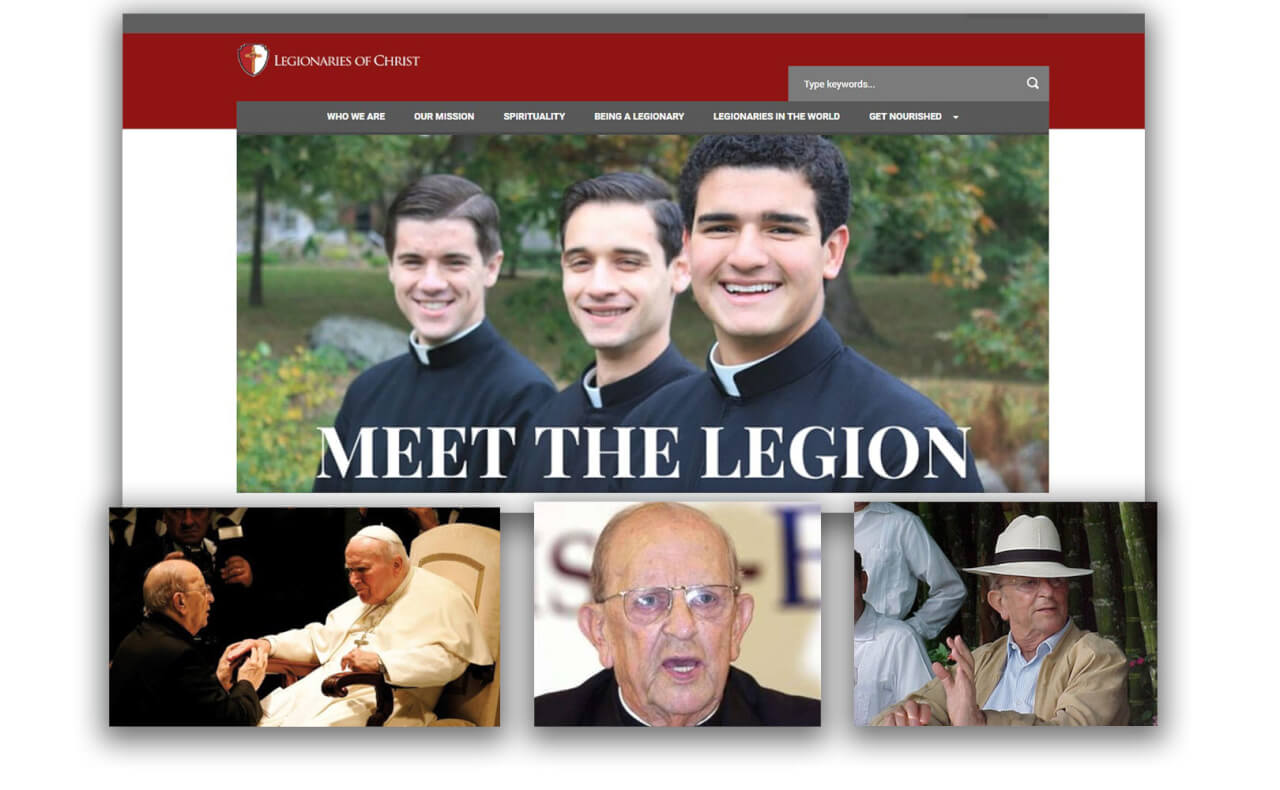In a report from Rome yesterday, National Catholic Register correspondent Edward Pentin revealed that the Vatican knew about abuse allegations against the founder of the Legionaries of Christ, Marcial Maciel, since at least 1943. The order was founded in 1941. This means that from the very beginning, Maciel was engaged in the sort of horrifying predation that made him one of the most vicious sexual predators ever to infect the Catholic priesthood. He not only abused seminarians for decades, but fathered children with various women – and then raped those children, too.
And now today – the same day that Catholics around the world are reading Pentin’s report – the Legionaries are celebrating the commemoration of their founding by “13 boys and a young seminarian.”

The post reads:
78 years ago, in the middle of a world war, 13 boys and a young seminarian had a dream. They had nothing, only a dream: a dream to bring Good News to society and to transform it. They had neither a priest of their own, nor money of their own, nor a house of their own: just a basement of a store in Mexico City… and a dream.
Today, 3 January 2019, that dream is a reality. The Legion of Christ has about 1000 priests, 450 brothers in formation, and four bishops present in four of the seven continents. But there was more in the dream than what was perceived at the beginning. The river of the charism which gave life to the Legion of Christ, God also intended to give life to a wider reality: Regnum Christi.
With Legionaries, consecrated men and women, priests, and lay members, Regnum Christi has more than 20,000 members in six continents. Our apostolic outreach ranges from challenging businessmen in New York City to helping the needy in Haiti, from forming college students in Europe to forming children in poor areas of Mexico. We have universities, schools, parishes. We use social media to spread the Gospel. We engage adults, youth, and children. In a phrase, we form apostles, Christian leaders at the service of the Church. We make present the mystery of Christ who calls his apostles, reveals to them His Sacred Heart, forms them, and launches them to bring his redemptive love to everyone and to form disciples of all nations.
May God give us the grace to fulfill our mission on earth. We want to thank all those who have made our dream a reality. God bless you all, and happy 78 anniversary!
(NB: Since I first commented on their post, they have edited it to remove the first paragraph – the one mentioning the “young seminarian.” The screenshot reflects the original.)
That young seminarian, surrounded by the kind of boys he was only too keen to turn into victims, was none other than Marcial Maciel, who was kicked out of various seminaries for reasons the Legionaries were only too happy to weave into the mythos of a persecuted saint. Now we have a rather different idea of what the reasons may have been.
My Own Backstory
I am not, I must admit, unbiased when it comes to the Legionaries of Christ. I have a long history with them. They were a profoundly formative influence on me – and they almost cost me my faith. I am fortunate inasmuch as I was never a victim of the sexual abuse that finally brought down their founder. But he created a fiction – an organization designed to give him power, money, and access to victims – dressed up in a superficial veneer of Catholic orthodoxy that drew in countless good men and women wanting to live their faith in a difficult time in the Church. It used up many of them and tossed them out, hurting and lost. It was essentially a spiritual bait and switch, with loud papal approval, and it has damaged countless souls.
I was one of them.

To give the short version, I was directly involved with the Legionaries and their lay movement, Regnum Christi, from age 14 to 19. I held leadership positions at various levels of the organization, including regional coordinator for their youth group, ECYD, and mission director for Youth for the Third Millennium. I was also (or so I was told) the first young men’s Regnum Christi team captain in the North American Territory.
For that short period of time at a critical moment in my life, I was deeply invested. I lived with Legionary priests in community for my entire senior year of high school at the Highlands School in Irving, Texas (1995-1996). I went on five different mission trips in four countries. I became a full-time member of the Regnum Christi “co-worker program,” leading youth groups and teaching a daily religion class at a Regnum Christi school outside Atlanta, Georgia. Again, in that scenario, I lived in community with a Legionary priest and seminarian. The entire time, I was being groomed for the priesthood. And the vocational pressure I felt – I was told by more than one Legionary priest that they “knew” I had a vocation – played havoc with a lifelong struggle I had with scruples and chronic anxiety. This was made even more acute because of my Catholic upbringing – I wanted so strongly to have the approval of these dynamic priests, who became like stand-in fathers during my first moments of independence as a young man.
I saw at various points that there were problems with the Legion and Regnum Christi, but I brushed them off. It bothered me that they lied to people all the time, and with such ease – even in very serious situations. They manipulated and used their recruits. They sought to sign up the wealthy and the powerful over and above the genuinely virtuous. They used events like mission trips – ostensibly to evangelize fallen away Catholics or non-Catholics – to lure in energetic young Catholics who would then be aggressively recruited by current members. A group of Regnum Christi men were told by the priest with us at one particular mission that if we weren’t there to recruit people, there was “something wrong with you.” I remember being angered by the incongruity. I was there to evangelize people to bring them into the Church! I had thought that was the point.
I remember having arguments with one of my Regnum Christi friends about some of these things. He was troubled by them, but I rationalized them away. I needed the Legion to fill in all the needs I had as a young man for approval and mission and clarity of purpose. I was willing to overlook a great deal.
I came across an old letter of mine, written to Fr. Maciel (thankfully never sent) during my “co-worker” days. I am filled with a sense of revulsion when I read it and see the hold the man’s cult status had in my younger self. I wrote:
Your intimacy with Christ grants you a much clearer vision of His will than my own selfish view. I believe that it is even possible that you may be able to tell whether one has a vocation or not. I don’t know if you have to be in their presence to do this or not. The closest I have been to you has been when I touched your hand as you exited the Easter mass at the Onawak [sic] following the Mega mission 1996. (After you gave a talk that touched me deeply, even though it was in Spanish, so much so that I had to hold back tears.) I need to know your view on this. I need help. I know that you are Christ’s instrument, and that he can use you to form me. To help me. Please help me.
I was desperate. I was being made to believe I had a vocation even though I didn’t want one. I was brainwashed into thinking that Maciel was some holy guru who could discern God’s will with a clarity that could cut through all my anxiety and confusion. I thought he had some power to tell me what only God could.
Strangely, it was God who gave me the answer, through another, non-Legionary priest. During the Christmas break of 1996, when I was home visiting my family on leave from my “co-worker” assignment, I was approached by the new pastor at our parish after a daily Mass. He somewhat sheepishly asked me to go out to breakfast with him, and during that conversation, he essentially told me that he felt prompted by God to speak to me. “I don’t know how to explain it to people…but sometimes I get these feelings that God wants me to talk to people about something. I tried to leave the sacristy, but something told me I needed to speak to you and I had to come back.” We discussed my involvement with the Legionaries, and he let me lead. When I told him how unhappy I was, he said it was this that he wanted to talk to me about. That I needed to get out of there for my own well-being. It was the push I needed, and I went home and wrote a letter saying I wouldn’t be coming back. I tried to make it as amicable as possible, and I faxed it to the superior of my house of apostolate.
The Legionaries didn’t do amicable separations. It was a cult operation, and you were either all in or all out. They deployed Saul Alinsky’s thirteenth rule against me so fast it made my head spin: “‘Pick the target, freeze it, personalize it, and polarize it.’ Cut off the support network and isolate the target from sympathy.”
The Legionaries contacted my friends around the country in other assignments. They contacted my acquaintances. They called my girlfriend’s mother and sister – and I had never even met her sister. They began telling everyone who knew me that I had left because I “wasn’t generous” and that they should not get involved with “what happened between Steve and the Legion.” One friend was told by a couple of seminarians that he didn’t really know the “whole story” of what I had done. Another had it explained to him as follows: “You have to look at it like you and Steve were marching into battle together up a mountain. On the way up the mountain, Steve was shot and fell back down the hill. But you have to leave him behind. The war must be fought. You have to press on. There’s no time to look back.” When my friend laughed in the priest’s face about this, the priest insisted, “He’s a fallen comrade. You have to leave him behind.”
Many of these friends stayed with me. Eventually, many of them came to also see the truth and left. Some are now the godparents of my children, twenty years later. At the time, though, the damage these betrayals did to me, and to my faith, was incalculable. The Legionaries were not just something a person could be loosely associated with. They became my identity. They became my way of relating to God. They became my surrogate family and, in a way, my surrogate Church. They had so long acted as though the Legionary way was superior, that the standard institutions of the Church were so inferior, that they had created in me an active dislike of any manifestation of “normal Catholicism” as something beneath us. They would go on and on about the poor formation of diocesan priests and bishops, make hostile comments about other religious orders, and constantly hold themselves up as the foot soldiers of Christ in this grand battle for the soul of the world.
Maciel was at the heart of all of it, being deified as a living saint who never said no to Christ.
I was a member of a cult, and the cult subverted the good of the individual to the good of the enterprise – which existed to serve the cult leader. Even though I never had a conversation with Maciel, my entire life was dominated by the culture he created. And even these outward rings were incredibly damaging.
From Co-Worker to Enemy
I spent most of my college years at Steubenville trying to recover from the Legionary hangover I had. What started as the bewilderment and pain of unexpected betrayal turned into focused anger. I still struggled with vocational anxiety. I struggled with my faith in general, because I felt as though I had abandoned everything to God and had been stabbed in the back for my trouble. But my true friends stayed with me, and things started to become clear: the deceit, the manipulation, the detraction, the pressure – all of these were tools being used to control the members of the movement, who were mere utilitarian playthings in the hands of the organization and its larger agenda. And I was very much not alone in being a victim of these practices. I began collecting stories, and I found myself grateful that things for me were not as bad as they were for others.
I spent much of my time in college actively thwarting the Legion’s recruitment efforts there. I became so effective in inoculating my peers against the standard recruitment tactics that the recruiters began warning prospects to avoid me. One young woman came to me and said, “They said not to talk to you, so I want to hear what you have to say.” Another friend broke down in tears when I began telling her what they did and why they should be avoided. I didn’t even know they had been recruiting her, but the pressure she was under to join was so intense that she just started crying when I essentially gave her permission to say no.
All of my efforts were on the level of protecting people from manipulation, deceit, and illicit vocational pressure – and any consequent damage to faith. I had been pressured, I had been used, I had been lied to in spiritual direction about something very important to me, and the resentment I felt about that ran deep. I didn’t want to see anyone else suckered in. But I wasn’t even thinking about the sexual abuse component. The truth was, I didn’t really take it seriously, because it seemed entirely unproven.
The True Nature of Maciel
As bad as these other things were, I honestly had no idea the kind of psychopathic figure Maciel truly was. I suppose that in retrospect, I should have, because I had had a front row seat to the Legion’s panic about the new round of accusations against Maciel during my time as a co-worker. In early December of 1996 – just weeks before I made my decision to leave – every full-time member of the apostolate in the United States was flown to the Legionary HQ in Cheshire, Connecticut on short notice (and at what must have been phenomenal expense) in the hopes that the crisis could be averted. We had just returned from Cheshire, where we had been for Thanksgiving, and we were told to pack our bags for a flight in the morning. No further explanation given.
The briefings on the matter at hand – the expected forthcoming revelations of sex abuse accusations against Fr. Maciel in the Hartford Courant – appeared to have been segregated on need-to-know levels. The priests got one briefing, seminarians in houses of apostolate got another, and so on, down the line. When it came to the classroom full of co-workers sitting there, wondering why we had been dragged there to wait for some unknown purpose, we were ultimately told very little at all. “Some accusations are coming out in the media against Fr. Maciel. They’re not true. Don’t even read them. If anyone asks, tell them it’s all false.” It was an amazingly tone-deaf approach to the problem. But then again, it was 1996. The internet wasn’t a factor as it is now. None of us had a cell phone. To find the information we were being told to avoid was going to take some work, and it was far easier not to find it than to track it down. I don’t think I actually came across the reporting until the following year.
And still, even when I had finally read some of the accusations, I found them so grotesque that they were difficult to believe. I was convinced that Maciel was a corrupt man – it was why I was seeing the same problems in every geographical region of the apostolate – but these were the days before the clerical sex abuse scandal really exploded, and the kind of thing that was happening was really hard to grasp.
In 2005, on the day the Legionaries elected Fr. Álvaro Corcuera as their new general director – a year before the world had to confront the depth and depravity of the accusations against Maciel – I wrote something on my blog at the time demonstrative of the fact that I still didn’t see the whole picture:
I am unlike many who have had bad experiences with the Legion in that I do not believe the problems exist in a vacuum, but rather, start at the top – if for no other reason than that Fr. Maciel indulges a cult of personality around himself that is so strong it usurps common sense and proper Christian humility. But there is a systemic problem of distortion of Catholic principles throughout the movements founded by Fr. Maciel that speaks of a certain corruption of methodology, not an accidental distortion of solid principles.
It was roughly around this same time that I was made aware of an investigation that started at Steubenville into the recruitment activities of the Legion on campus. I was called by one of the Franciscans there because of my reputation as a Legionary counter-agent, and we had a long chat. Before long, I heard that this particular investigation had been shut down but that it was picked up by others at another Catholic university, and that law students were being used to compile evidence. Testimonies were gathered from anyone willing to give them. A dossier was compiled – turning up a number of troubling revelations, including allegations of civil crime – and, through the hands of a bishop who had already committed career suicide, placed in the hands of then-cardinal Ratzinger, who was, at the time, prefect of the Congregation for the Doctrine of the Faith.
Less than a year later, Ratzinger would be elected pope. Shortly after that, in 2006, it was announced that Maciel had been assigned to a life of prayer and penance because of the charges against him – a woefully inadequate punishment for a man guilty of such heinous crimes. It was never clear what role that dossier played, but it seems shortsighted to believe that it wasn’t a factor in the Vatican finally taking action.
The Legionaries Today
The Legionaries of Christ, as an institute of religious life, cannot be separated from the person of their founder. This was made clear at their first general chapter, when it was written: “It has been ordained by God that the person and life or Our Father Founder cannot be separated from the life and spirituality of the Legion.” He was undeniably the worst kind of monster – and by some accounts, possibly even possessed. If you haven’t read this version of events alleged to have transpired at his deathbed, it is truly chilling:
Maciel died in a surreal drama where his life pieces converged with shuddering fall. In late January 2008, he was in a hospital in Miami, according to a Jan. 31, 2010 report by reporters Sota and Vidal of El Mundo. Although the article (available in English on exlcblog.com) is layered in opinion about Maciel’s character, it provides a detailed look at the crisis he created for his followers. In the hospital gathered Alvaro Corcuera, Maciel’s successor as director general; the Legion’s general secretary, Evarista Sada; and numerous other associates. Maciel reportedly refused to make a confession, stirring such concerns that someone summoned an exorcist, though the article does not describe a ritual. The men around Maciel were jarred when two women appeared: Norma the mother, and Normita, 23. At that point, Maciel reportedly said of the Normas: “I want to stay with them.”
The Legionary priests, alarmed by Maciel’s attitude, called Rome. [Fr.] Luis Garza knew right away that this was a grave problem. He consulted with the highest authority, Alvaro Corcuera, and then hopped on the first plane to Miami and went directly to the hospital.
[Garza’s] indignation could be read on his face. He faced the once-powerful founder and threatened him: “I will give you two hours to come with us or I will call all the press and the whole world will find out who you really are.” And Maciel let his arm be twisted.
After the priests got Maciel to a Legion house in Jacksonville, Fla., he reportedly grew belligerent when Corcuero tried to anoint him, yelling, “I said no!” The article says Maciel refused to make a final confession, and states flatly that he “did not believe in God’s pardon.”
That is an opinion that Maciel’s sordid life might well support, but for which, in fact, we have no proof.
This is the same man who wrote, in his booklet “Time and Eternity”:
I am satisfied that I said yes to God and fought to be faithful to everything he asked of me.
However, over and above all this, absolutely and overwhelmingly my complete and exclusive attachment to God has always prevailed.
That they would celebrate today this impious man’s founding of the order with those 13 boys – we do not know how many of them he may also have preyed upon – is evidence that the Legionaries remain infected with the Satanic purpose of their founder.
Sadly, I know there are still good men and women affiliated with them, wanting only to live an authentic Catholic life through a vibrant apostolate. But they fail to recognize the impossibility of an order founded by such a man of ever truly producing good fruit. There is no precedent in the history of the Church. Most founders of major orders – Francis, Dominic, Benedict, Bruno, Ignatius – are saints. They did not act, as Maciel did, as though they were demons walking around in human skin.
It is an injustice to those still affiliated with the Legion out of misplaced devotion that the Vatican has allowed this charade to continue. There is no excuse not to have shut the Legionaries down, disbanded them completely, and sent their seminarians to other orders and dioceses (after a thorough evaluation). Frankly, their buildings should be exorcised and the earth salted (preferably the blessed kind) wherever their apostolates stood.
It should disturb all Catholics of good conscience that the Legionaries as a corporate body, as an ideal some of them clearly still think is worth “celebrating,” is allowed to continue. The only reason I can think of why that was permitted can be summed up in the nickname people in Mexico have for the Legionaries: “The Millionaires of Christ.” If they had any charism to speak of, it was fundraising. They handled breathtaking amounts of money and could summon the funds for huge projects in the tens of millions of dollars in a matter of months. I can’t imagine they still have that same kind of pull, but their existing assets are not negligible.
Doesn’t it always come down to this? Every time the Vatican allows corruption to go unchecked, follow the money. It was the story with McCarrick, arguably the Church’s most prolific fundraiser, and it has always been rumored to be the story with the Legionaries. It is an awful thing to consider that such a base motivation can be used to allow evil to flourish by men who are supposed to be entirely devoted to God.
But how can anyone take the Catholic Church seriously on the sex abuse crisis, when the Legionaries of Christ are a textbook case study of the Church’s failure to act on information it had for decades? As long as they continue to exist – no matter how many times their constitutions are changed and they attempt to rebrand themselves – they stand as a black mark against the credibility of the Holy See in dealing with the corruption of clergy and predation on those in their spiritual care.






